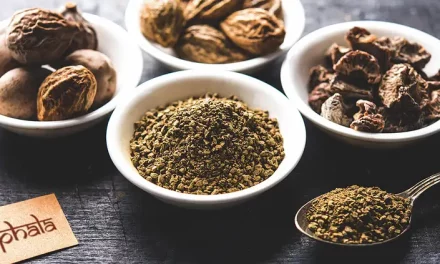Who doesn’t know the legends of the gods of ancient Greece and ancient Rome? Each culture provides a treasure trove of stories and myths. Go in search of the divine myths of Indian gods and just thinking about them, pictures in shimmering colors are created in our mind. Exotic scents and smells delight in thought. Demigods, avatars, demons, beautiful women and formidable apparitions meet us. Stories lovingly pave the way. They kidnap us into another world. They delight us and teach us a wisdom that we are able gratefully to accept.
With the following story we start our series about the various Indian gods. This first episode presents Dhanvantari, the god of ayurveda, in the role of the main god. Newly interpreted in contemporary style by Irene Rhyner.
Dhanvantari
Long ago, the devas (angelic gods) and the asuras (demons) shared a common desire. As demigods they had a long life, but still they were not satisfied. They all had the same goal in mind – they wanted to become immortal.
Brahma, father of the gods, had mercy on them. However, entering the heaven of the gods had to be earned. He, therefore, gave them a seemingly impossible task. If they managed to churn butter from the primeval ocean of milk, he would give them the elixir of infinite life.
The bright sattva energy of the devas and the dark tamas energy of the asuras now mixed with the passionate rajas energy. With the help of the three forces, the demigods conceived a plan that would bring them closer to their goal. They acted practically, employed their manual dexterities and got help from Mount Meru and the serpent goddess. They wrapped the latter around the former, then alternately, the asuras pulled on the head and the devas on the tail. Thus the first whisk was invented. They stirred, stirred and stirred the ocean of infinity …… and at some point, together, they actually did it. The first waves of cream arose on the shore of the primeval sea. There was a rumbling thunder, followed by flashes of lightning and gigantic rainbows. A sweet melody sounded. Surrounded by frothy milk, a beautiful creature rose from the primeval sea with a golden bowl in one of its four hands. “Dhanvantari”, the bearer of the sacred nectar “Amrita”. He brought the eternal life essence to the demigods.
He shone supernaturally, was beautiful and held the eagerly desired nectar of life out to them. However, whoever thinks that all should have been happy, in harmony and contentment, is mistaken.
Even demigods are not infallible. The demons secretly stole the nectar during the night wanting immortality for themselves. The devas, completely stunned by the demons’ deed, searched for a plan to reclaim the nectar. Vishnu, one of the devas devised a stratagem and metamorphosed into a female avatar. As the “beautiful Mohini” he bewitched the demons and promised he would split the nectar equally among all the demigods. The demons, enraptured by his feminine charm, believed her and handed the precious amrita to her. Unfortunately, there was a “small” problem: the limited amount of the precious liquid!
After all the devas had received a drop of the nectar of immortality virtually nothing was left for the demons. Only the shrewd demons Rahu and Ketu were able to cheat on the devas, disguising themselves, and caught a drop of nectar each. However, they could not escape unseen and had to pay with the loss of their heads. But since they had already received amrita, they remained immortal. Somewhat differently, nevertheless, than they had hoped.
Dhanvantari remained impartial, he did not interfere in the dispute. His job was to teach and bring bliss. Henceforth he was considered the fountainhead* of long life (ayurveda).
As the patron god of health, he was now able to choose his disciples on earth. He taught the most important scholars in the healing arts of ayurveda. He was particularly pleased with the studiousness of his student “Sushruta”, the author of one of the first and most important works on ayurveda.
After he had conveyed his knowledge, he was called back to the realm of the gods. From there, the ayurveda patron observes life on earth. He is full of love for people, nature and all living things. He wants to continue helping.
With the help of his sattvic healing energy and his vast knowledge, he always finds ways and means to support all ayurvedic healers. He helps us to solve difficult tasks and sends us new inspiration, so that the knowledge of ayurveda can grow and prosper. For the benefit of all living beings.


 Alexander Grabchilev / Stocksy United
Alexander Grabchilev / Stocksy United 






